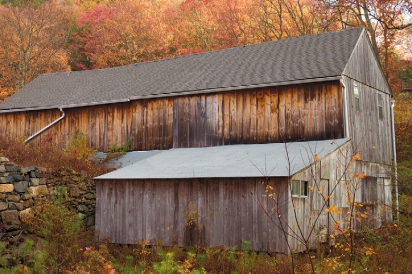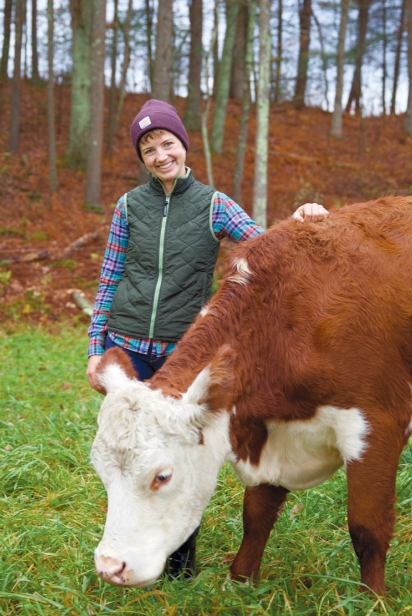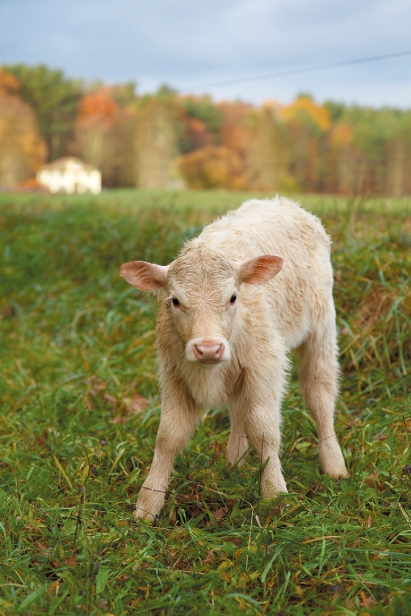Deep Roots Farm
How Katie Steere is Bringing Her Family’s Seventh-Generation Farm Back to Life
Just a few short years ago Katie Steere’s life looked very different than it does today. There were no early-morning walks in the pasture tending cows, collecting eggs and feeding pigs. There were no egg-and-bacon breakfasts with ingredients she produced from her farm. In fact, most mornings began at a desk, staring down a computer screen and wishing for a change.
After graduating from Northeastern University with a degree in international business and finance, Katie moved to California and pursued a career path that left her burnt out and longing for a change. She spent her days behind a desk, daydreaming of a return to her family farm in Chepachet, Rhode Island, where she was born and raised.
“For so long I was eager to leave the farm and experience city life, and then suddenly everything was pointing the way back to Rhode Island,” says Katie. “I didn’t like my job and I was volunteering at a farm on the weekends. I loved having my hands in the dirt, being far away from the noise and bustle of the city.”
When she could no longer ignore the pull, Katie quit her job and spent the next five months hiking the Pacific Crest Trail before beginning an internship at Polyface Farm in Virginia.
“Hiking the Trail was a great trial run for the life of a farmer,” Katie says. “Every day, whether I felt like it or not, I had to wake up and get in my 35 miles. In the same way, when you are farming, you can’t decide when you want to work. You just wake up every morning and start your chores.”
Although Katie was raised on the Chepachet property, the farm had ceased operations 10 years before she was born. The land had been in her family for seven generations, dating back to the 1700s, and through the years the farm had served as a water-powered sawmill that provided electricity, a dairy farm and a turkey farm.
While she was growing up her father maintained the property, cut hay and tended to a few cows, which acted more as pets than livestock. Since she wasn’t raised with a farming background, Katie had an opportunity with the Polyface internship to gain the knowledge needed to bring her family’s farm back to life. Polyface Farm is run by farmer, author and sustainable farming advocate Joel Salatin, whose story is profiled in The Omnivore’s Dilemma by Michael Pollan and featured in the award-winning documentary film Food Inc.
“I was drawn to Polyface because Salatin took a tired, conventional farm, and by using rotational grazing and sustainable practices, turned it into a successful, abundant farm,” Katie explains. “It gave me hope for our land.”
While at Polyface, Katie wrote her business plan and placed her first farm order for 11 pigs and 200 chickens. The process of determining the direction of the farm was very personal for Katie.
“A huge reason that I decided to become a farmer is because I was a vegan for four years and became very unhealthy on that diet,” she says. “When I finally admitted to myself that I needed to eat meat again, I couldn’t go back to factory-farmed meat. That’s when I discovered Salatin’s farm.”
With her goal of producing sustainably and humanely raised pork, beef and chicken decided, Katie completed her internship, moved back to Rhode Island and set to work her first winter on the farm improving the infrastructure. Thirty acres of pasture had to be fenced in for the cattle, the old dairy barn needed to be retrofitted to winter the cattle and an egg mobile needed to be built to house the chickens.
In returning to her home state, Katie found a community that welcomed her with open arms and provided the connections she needed to sell her meat.
“The Rhode Island community has been really welcoming, and the Young Farmer Network, especially, has proved invaluable,” Katie says. “I met two vegetable farmers who began selling my chicken, pork, beef and eggs through their CSA, and I began selling at three farmers’ markets.”
Katie also offers her meat and eggs for sale at her farm, and loves welcoming people to the property. In the future she envisions renovating the barn and hosting classes ranging from yoga to cheesemaking to fermenting, as well as farm-to-table dinners. She also hopes to rent space on the property through Airbnb. “I want this place to be shared, and along with the growth of the farm, I want to build a community of people who are connected to the food they eat and their environment.”
It’s mind-boggling to think that Katie is still in her first year of farming. Her passion, energy and drive have led to growth and success. Edible Rhody will be checking in with Katie and Deep Roots Farm in a future issue to see if her dreams and goals for the farm are brought to fruition and to learn of the challenges in the process.
According to the United States Department of Agriculture, “The average age of principal farm operators in 2012 was 58 and has been greater than 50 since at least the 1974 Census of Agriculture.” As we look to the future of farming in our country, and in the State of Rhode Island, it is critical to support our young farmers. Katie is one such farmer and we look forward to charting her success through the coming years.
To find out more, including how to purchase meat and eggs, visit DeepRootsFarm.org.








